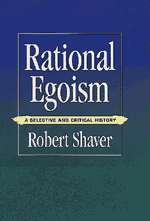4 - From Hobbes to Bentham
Published online by Cambridge University Press: 05 November 2011
Summary
When Sidgwick was asked to defend the prominence he gave to rational egoism in the Methods, one of his replies was to note that there is “preponderant assent” to it in “the common sense of mankind” and “the history of ethical thought in England.” (FC 483) Rational egoism has “wide acceptance” – Sidgwick even claims in the first edition of the Methods that “there seems to be more general agreement among reflective persons as to the reasonableness of its fundamental principle, than exists in the case either of Intuitionism or of … Utilitarianism.” (ME 119; ME [1] 107; also ME 95, ME [1] 388, 461) “It is not defined,” by those who replied to Hobbes, “that the self-love which seeks the agent's greatest happiness is a rational principle of action.” (UG 30; also ME 171n) In the Methods and the Outlines of the History of Ethics, he provides evidence for this claim, citing Hobbes, Shaftesbury, Butler, Hume, Paley, Bentham, and, more surprisingly, Cumberland, Samuel Clarke, Berkeley, Reid, Stewart, Kant, and Comte as all admitting the ultimate reasonableness of seeking one's own interest. Given this heavyweight lineup, it is not surprising that Sidgwick found that “it is hardly going too far to say that common sense assumes that ‘interested’ actions, tending to promote the agent's happiness, are prima facie reasonable: and that the onus probandi lies with those who maintain that disinterested conduct, as such, is reasonable.”
- Type
- Chapter
- Information
- Rational EgoismA Selective and Critical History, pp. 110 - 158Publisher: Cambridge University PressPrint publication year: 1998



